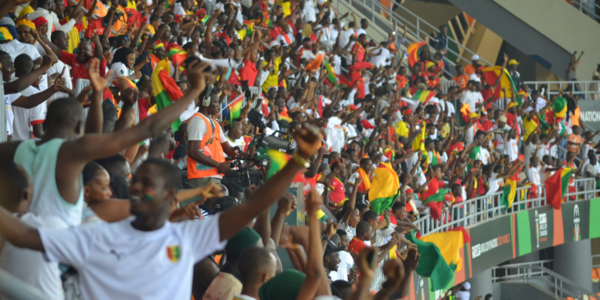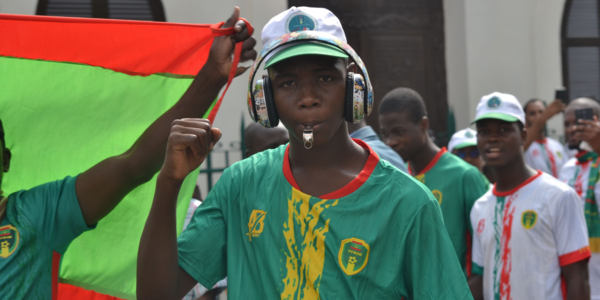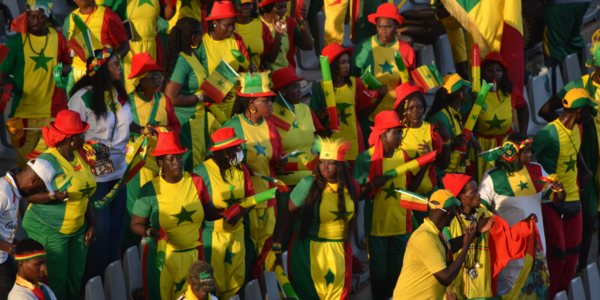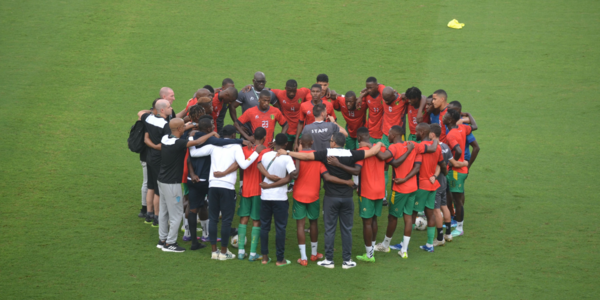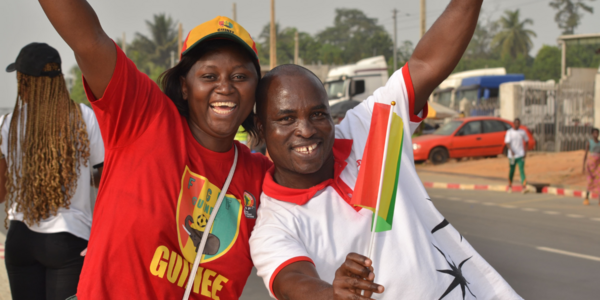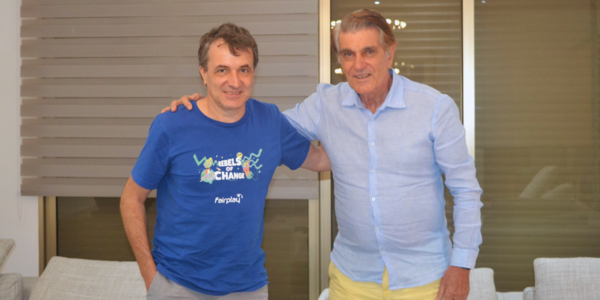Africa Cup in Côte d'Ivoire after the round of 16: drama, resurrections and academies
Africa Cup of Nations 2023
This Africa Cup is more entertaining than it has been for a long time. And it is full of drama and surprises. Since Egypt at the 2010 Africa Cup, no defending champion has made it past the round of 16. This year, Senegal, who won the title for the first time two years ago in Cameroon, had to bow out against the previously weak hosts. After an embarrassing 4-0 defeat to Equatorial Guinea, the coach was sacked before the team had even made it to the knockout phase in third place. As soon as substitute Franck Kessie equalized the score at 1:1, there was no holding back at the public viewing in Treichville, a district of Abidjan. When Côte d'Ivoire finally won the penalty shoot-out, fireworks were set off everywhere and the euphoria seemed boundless.
The hosts experienced a true resurrection in the stadium in Yamoussoukro, the bizarre capital with the largest Roman Catholic church in the world, and are now once again among the serious contenders for the title.
However, it was not only the passive Senegal that got caught out in the round of 16, but also the highly-favored Moroccans. Having sensationally reached the semi-finals at the FIFA World Cup in Qatar, South Africa needed only a well-coordinated team performance to see off Morocco 2-0. Finally, seven-time champions Egypt also had to pack their bags. DR Congo were the more agile team against an ageing Egypt without superstar Mohammed Salah and prevailed on penalties after a 1-1 draw. Omar Marmoush from Eintracht Frankfurt was initially only on the bench. I've been chasing an interview with the ex-Wolfsburg player for days. The day before, the Egyptian association's media officer, Mr. Mourad, promised me: "If we win, we'll come back to Abidjan on Monday, then we can do the interview." It doesn't come to that. So the fact that Egypt is eliminated annoys me personally. In soccer, and even more so in West Africa, you should never be too rigid with your plans.
Trip to the Ebimbe Stadium
But what is definitely on my agenda is a game in the final stadium. With construction costs of 163 billion francs CFA (€248.5 million euros), the new Stade Olympique Alassane Ouattara d'Ébimbé stadium is the showpiece of the ambitious host nation.
For the first time since my arrival eleven days ago, I make my way to the Stade Alassane Ouattara, 25 km from the center of Abidjan. The round of 16 match between Equatorial Guinea and Guinea is on the schedule - not a classic, but the prospect of a game with less hustle and bustle. The cab heads north, first through the green and wealthy Cocody, then through the less affluent Yopougon, the district where Didier Drogba grew up. The traffic jam starts well before the stadium, then only buses are allowed to continue, I change to a motorcycle cab. The young driver wants to take a second passenger, but I protest successfully and then it's over for motorcycles too. I move on in the stream of mainly Guinean fans and see the imposing arena in the open landscape for the first time. I meet Moussa Bamba from Abidjan, who works for the parliament and will be translating the media conference into Arabic. We quickly find the entrance for the media and I even get an admission ticket for the media conference after the game. By the time I sit down in the press gallery high up, the match has already started. And the setting is impressive for a game like this.
The huge oval with a capacity of 60,000 is surprisingly well filled with officially 36,340 fans. Accompanied by a brass band, the organized Guinean fan delegation gets down to business, as does the choreography of the red-clad Equatorial Guinea fans, who dance throughout the game. On the pitch, both teams are initially cautious. The temperatures in the late afternoon are bearable throughout due to the dry Harmattan wind from the Sahara. The surprise team from Equatorial Guinea confidently won the group ahead of Nigeria, humiliating hosts Côte d'Ivoire 4-0 in the process. Autocrat Teodoro Obiang Nguema declared the following day a public holiday to celebrate the victory. The heart of a team of non-stars is 34-year-old captain Emilo Nsue, who won the European Under-21 Championship with Spain in 2011, but plays for Equatorial Guinea along with 15 other Spanish-born players.
After the red card for Federico Bikoro (55 minutes) and the substitution of Serhou Guirassy from Stuttgart, the momentum is on Guinea's side. After a foul by Sylla on Iban, the VAR intervened - as so often at the tournament - and awarded Equatorial Guinea a penalty (68 minutes). Nsue, the leading scorer (5 goals), stepped up and steered the ball to the far right post. The game ends with a dramatic header from Mohamed Bayo in the eighth minute of stoppage time. Guinea face the Democratic Republic of Congo in the quarter-finals.
The departure from Ebimbé Stadium back to the city center went a little less smoothly than hoped. The many journalists and, compared to previous Africa Cups, visibly more journalists stormed vehemently to the media buses provided. Nobody wanted to miss the return trip to the media center in Treichville late in the evening. An unnecessary scramble was the result.
A night-time journey on the official media bus from Yamoussoukro back to the economic metropolis of Abidjan had more serious consequences than one. After the match between Senegal and Guinea, the bus collided with the wall of a warehouse at 2am. The bus driver was the most seriously injured. Alex Cizmic, who publishes the African soccer blog Kura Tawila, and other journalists escaped with broken bones and bruises. In hindsight, my decision to stay in Yamoussoukro after the game and not get on the bus was a fortunate one.
Transfer of young players to Europe: between education and exploitation
Anyone who has studied African soccer will inevitably come across the name Jean-Marc Guillou and his youth academies. The former French team player and later coach, who everyone just calls JMG, joined ASEC Mimosas, the most successful club in Côte d'Ivoire, as sports director in 1993. In 1994, he founded the legendary ASEC youth academy in Sol Béni, Abidjan.
I get in touch with Jean-Marc Guillou's adopted son through a Belgian player's agent. He arranges a meeting with JMG at his posh home in the Riveria-Golf district, just behind the US embassy. The now 78-year-old sits relaxed on his designer sofa, his young son Jonathan translates my questions into French.
When asked what motivated JMG to leave a career as a coach in Europe (OGC Nice, Neuchâtel Xamax, AS Cannes) and move to the Ivory Coast, he says:
"Well, simply the fact that it was possible to do things here that were almost impossible in Europe. If you wanted to educate children in Europe back then, they were in school for 10 or 11 hours, it was difficult. And here in Africa it was much easier. There were a lot of good young players and many didn't go to school, so we could get them to go to school and play soccer at the same time. So we had to find educators and started working with young people who had talent."
The success of his method soon became apparent. At the 1999 CAF Super Cup between ASEC Mimosas and Espérance de Tunisie, JMG was coach of ASEC and decided to field a team of academy teenagers - including Kolo Touré, Aruna Dindane and Didier Zokora, the oldest being 19-year-old goalkeeper Boubacar Copa. The game in Abidjan ended sensationally with a 3:1 victory.
From 2001, Guillou went to Belgian first division club KSK Beveren as sporting director and once again opted for his academy player. Through his friend Arsene Wenger, talents such as Emmanuel Eboué and Gervinho ended up at Arsenal. The four-time African Footballer of the Year, Yaya Touré, made a career for himself at Barcelona and Manchester City.
At the 2006 World Cup, no fewer than 11 of the 23 players were trained at the Academie de Sol Béni. Guillou later founded academies halfway around the world, from Bamako in Mali to North Africa, Madagascar and Vietnam. The JMG academy became the much-copied prototype of the hundreds of soccer academies that now exist in sub-Saharan Africa.
The JMG Bamako academy also functions as a kind of workbench for Red Bull Salzburg. The list of Malian players who have been transferred to the city of Mozart is impressive: Amadou Haidara, Diadie Samassekou, Mohamed Camara, Nene Dorgeles, Douda Guindo, Sekou Koita, Youba Diarra, Mamady Diambou, Mamadou Sangare and Ousmane Diakite.
Jean-Marc Guillou appreciates the FC Salzburg. "We had a lot of transfers with Salzburg because they liked our players," says Guillou. "The negotiations we had were always very clearly defined. In addition, Liefering plays in the 2nd division. That's a good thing, because our players go to Liefering first and can settle in there."
Every two years, JMG Bamako organizes a two-week scouting event for their best players, where they exclusively invite RB Salzburg to scout talent.
"The next promotion starts in mid-March. We'll show them players who excelled at the U17 World Cup in December. We'll show them players like Hamidou Makalou. Through this promotion they can see the players before anyone else, they can choose one or two players and the youngster will then be in Salzburg and train and play there. So they can compare."
With the rise of African soccer in the European leagues after Cameroon's quarter-final appearance in 1990, the focus also shifted to the darker side of the migration of young West African players to Europe. At the time, Jean-Marc Guillou was seen as an example of a "human trafficker" who enriched himself by trafficking young people. I therefore ask Guillou what difference he sees between exploitation and education.
"I am often treated like a slave trader. However, there is a fundamental difference between the exploitation of talent and the training of talent. The exploiter is someone who has never done anything. He acts as an agent who watches games. Then he takes a player because he thinks he's good, then he'll see the parents and pay them €1000. He has done nothing for the player, they act like squatters. An educator is someone who educates young people and gives them opportunities, that's the difference."
During small talk, I asked the former player, who played for France at the 1978 World Cup, what he thought of young Ivorian star Karim Konaté from RB Salzburg. JMG's short answer: "I can't know all the players."
Now it's time for me to leave this friendly and football-loving country and head to Ghana. There are exciting soccer projects in Accra.
P.S.: And I have to report on a journalistic defeat: striker Bryan Teixeira escaped me twice in the mixed zone, in the victory over Mozambique and also after Cape Verde's 1-0 win against a strong Mauritania. I left the country during Cape Verde's quarter-final against South Africa and there was no third chance.
Monitoring the human rights situation and reporting on the 34th Africa Cup is part of the Our Game for Human Rights project, which is funded by the Austrian Development Agency (ADA).


